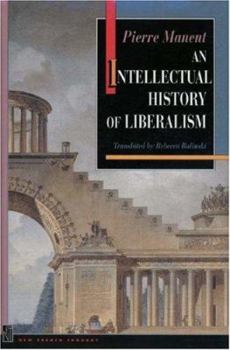An an Intellectual History of Liberalism
Select Format
Select Condition 
Book Overview
Highlighting the social tensions that confront the liberal tradition, Pierre Manent draws a portrait of what we, citizens of modern liberal democracies, have become. For Manent, a discussion of liberalism encompasses the foundations of modern society, its secularism, its individualism, and its conception of rights. The frequent incapacity of the morally neutral, democratic state to further social causes, he argues, derives from the liberal stance...
Format:Hardcover
Language:English
ISBN:0691034370
ISBN13:9780691034379
Release Date:October 1994
Publisher:Princeton University Press
Length:144 Pages
Weight:0.90 lbs.
Dimensions:0.7" x 6.0" x 9.0"
Customer Reviews
2 ratings
Machiavelli, Hobbes, Locke, Montesquieu, Rousseau and Tocqueville
Published by Thriftbooks.com User , 14 years ago
This book gives a practical summary of the origins of classical liberalism, as opposed to the contemporary American usage of the word "liberal". As an intellectual history Pierre Manent's concisely written book shows the evolution of ideas over time and anchors the main ideas to a few central thinkers, but gives no historical information (dates, characters, circumstances). What is the fundamental natural state of man, and what does the imply about rights and governance? How are the roles of civil society and state to be defined? How did liberalism come to suggest itself as an alternative to Europe's three original models: empires, monarchies and city-states? How does the liberal thinking of the Enlightenment compare to ancient Greek political theory? How were competing social interests to be reconciled after the French Revolution against the ancienne régime? The book indicates how influential French thinking and the French Revolution was for liberalism, but covers less about other influencers such as Adam Smith and John Stuart Mill who in some ways responded to the French influence. Manent's book is a stimulating and bracing reconsideration of the cultural and political matrix that gives form to modern life. The reader is naturally reminded of the self-satisfaction of contemporary politicians and parties, who pretend to be intellectual descendents carrying the torch of great thinkers. One central thesis of the author is that liberalism originates in the struggle to be free from religion in governance. This was not only necessary to confront the despotism of the Catholic Church but also to ensure a stable and therefore pluralistic foundation in the face of crumbling religious unity after Luther. Although liberty and equality are commonly thought to be biblical values, the new freedom of liberalism--rights of man, freedom of conscience, sovereignty of the people--only "came about just after the Christian religion had been totally stripped of all political power for the first time", and that which belonged to Caesar returned to Caesar. In the foreword, Jerrold Seigel discusses Manent's thesis, that liberalism need not pretend to any higher end. At a generic level, says Manent, we moderns do not enter into relations with others in order to realize some good or higher purpose inherent in human nature; if we do, we each have such wildly different ideas about what is good that it is meaningless and susceptible to be seized on by religion, arguing that religious good is greater than any merely natural good. Siegel suggests a slightly different perspective, that liberalism was a rebellious and at the same time restorative response to religious, scientific and economic conditions that were already undermining the Church. Siegel's alternative also requires no moral source outside the self, where people have the task of giving meaning to the individual and society. These non-moral approaches avoid the problem of classical Greek theory, that supposed inheren
Manent breathes new life into old works
Published by Thriftbooks.com User , 25 years ago
AN INTELLECTUAL HISTORY OF LIBERALISM has the deceptive appearance of a survey of liberal thought- one of many such overviews. What Manent presents instead is page after page of brilliant, original insights into the ideas of Locke, Hume, Machiavelli, Rousseau, Hobbes, Constant, and Toqueville, among others. I stopped reading in surprise every few paragraphs in some sections, to find my understanding of an old & familiar concept significantly altered- shown in an utterly novel light. Anyone interested in early liberal philosophy will find this book extremely valuable.






